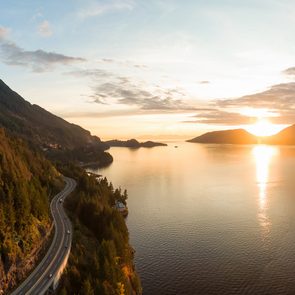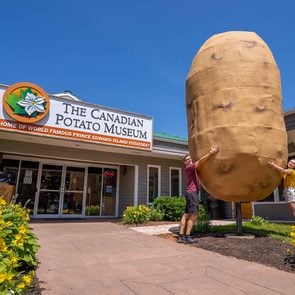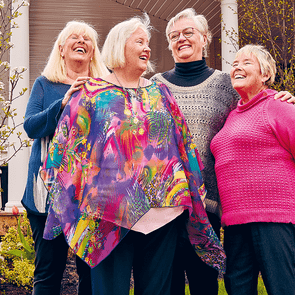Why Living In an RV Is Better Than Living In a House
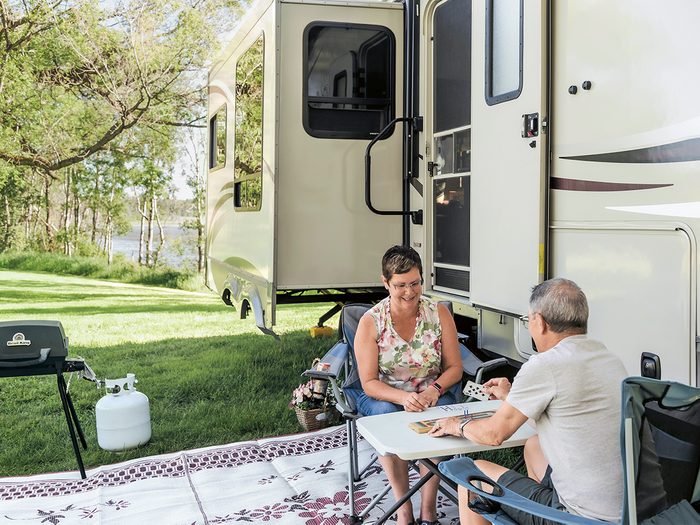
After retirement, this Saskatchewan couple sold their home and hit the road. They haven’t looked back.
Life turns on a dime. Or, in the case of Darrel and Brenda Frisken, on a chance reunion in April 2017 with old friends at Mr. Bill’s Family Restaurant near their hometown of Lloydminster, Saskatchewan. The other couple had just returned after spending the winter travelling in an RV.
As their friends described life on the road, a light went off for Darrel. The commercial HVAC and refrigeration technician, now 62, wanted to retire but didn’t yet know how: “I enjoyed my work, but I’d enjoyed almost all I could stand.” Brenda, now 61, had retired from her receptionist job at a retirement home and was happy enough in Lloydminster. As the Friskens, who’ve been married for 40 years, talked it over in the following days—going south for the winter, seeing more of their grandkids, boondocking (dry camping) under the stars—a fanciful idea became a plan.
They set about researching RVs, reading reviews and attending RV shows. A big motorhome was costly and awkward: you might want to tow a small vehicle for when you’re hooked up in a park. A travel trailer, which is towed, is long and difficult to manoeuvre in tight spots. A converted van was too small for them.
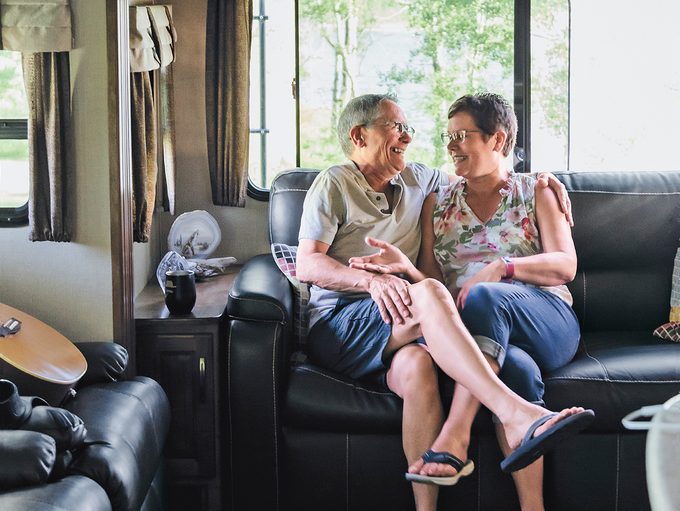
After months of deliberation, they decided that a fifth wheel—an RV that overlaps a towing vehicle, which supports much of the RV’s weight—was the ticket. Online they found the perfect setup: a 2016, 10-metre fifth wheel, and a used, low-mileage 2017 pickup truck. They got them both for less than $90,000.
George Carlin had a funny routine about how life is basically a process of gradually accumulating stuff. It took the Friskens over a year to downsize from their 2,200-square foot detached bungalow to their 320-sq.ft. home on wheels. Anything that wasn’t sold, taken by their two grown kids or donated to charity got hauled to the dump.
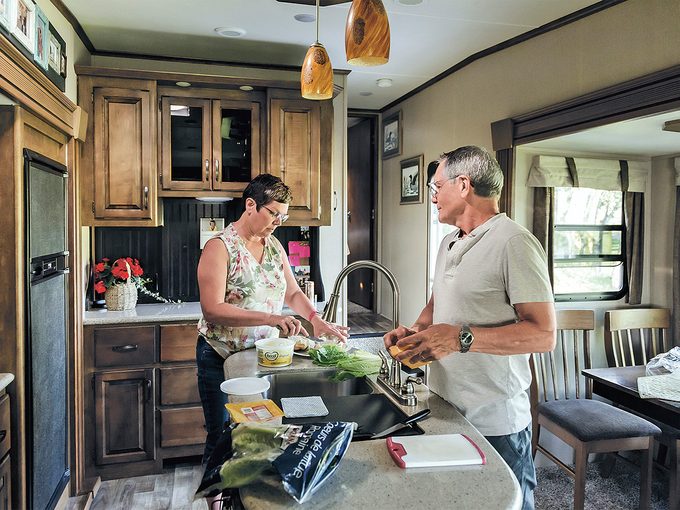
Then in March 2020, the pandemic happened. “The day the For Sale sign went up on the house is the day the first lockdown was announced,” says Darrel. “We didn’t know if the real estate market was going to crash.” Three months later they sold their bungalow for $310,000. Debt-free, with income from the house sale and from the couple’s mutual funds, they figure they can live in the RV indefinitely.
“Half our family thought it was cool,” says Darrel, “and the other half thought we were nuts.” You’ll get on each other’s nerves, was one prediction. How will you find time for yourself in such tight quarters? “We have headphones,” says Brenda, “so I can be watching a movie while he plays his guitar.” They each have a Kindle, and they watch workout DVDs together. Darrel goes on vigorous hikes, and Brenda goes for daily walks.
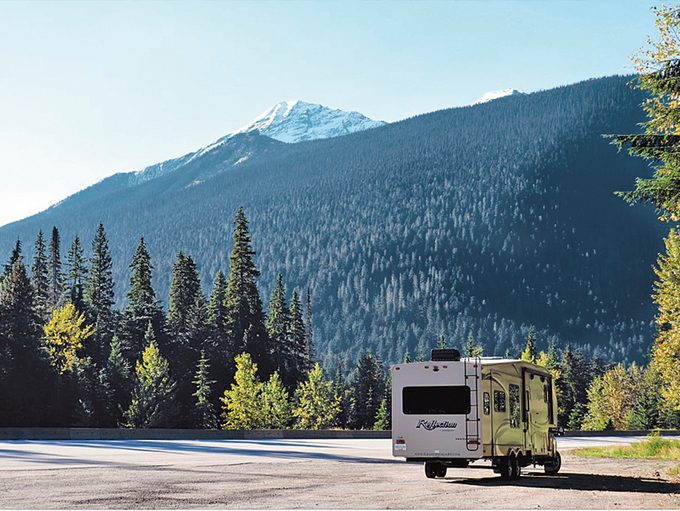
“You’d better be compatible, and you’d better be sure you both really want to do it. So far, no problem,” says Darrel. “You have to be really well organized—everything has its place—and we’re both pretty good about that.”
In the summer and fall of 2020, because the United States border was still closed, they visited family and friends in Saskatchewan and Alberta. It turned out lots of cooped-up people hit the road during the pandemic. RV sales went through the roof, demand pushed prices up and parks were booked months in advance. With so many stymied snowbirds stuck in Canada, the Friskens were extremely lucky—after making scores of inquiries—to find a pretty spot at River Valley RV Park in Keremeos, B.C., about half an hour from Penticton, where they settled in from October 2020 to April 2021.
Did they miss being part of their old neighbourhood? Not really. Doing without a dishwasher and washing machine was a drawback, but not a game changer. Trips to town every few days to discharge sewage and take on fresh water took only a couple of hours. FaceTime and Zoom let them stay in touch with family and friends. And RVers, like boaters, bond quickly, trade information and form a mobile community of their own. Darrel started a blog (RV Full Time on a Dime) and posted about everything from B.C. fruit stands and winter hiking to the best toilet paper to use in an RV (Great Value, at Walmart).
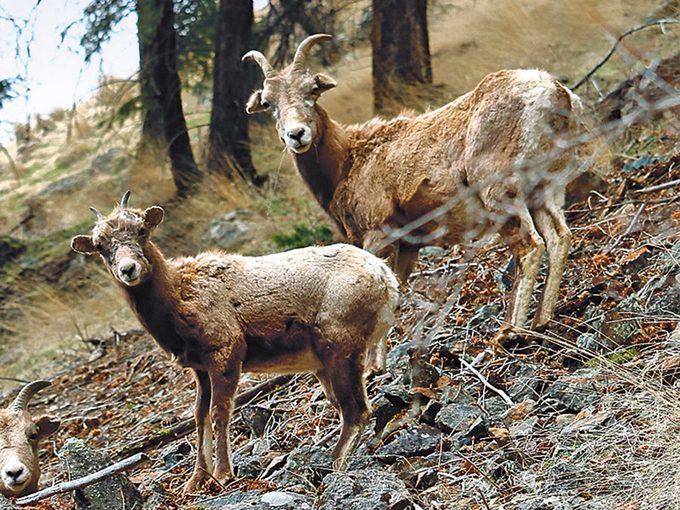
This year, Arizona beckons, including leisurely stops in Utah and other states en route. With Darrel being a handy guy and Brenda managing their finances, they live frugally (“We’re tightwads,” says Darrel). If all goes well, they plan to spend the next 10 years seeing new places, avoiding prairie winters and visiting friends and family. If they’re overtaken by ill health or misfortune, they’ll rent a condo.
As for dry camping under the starry sky, the Friskens have already done it a few times. They have solar power, so it’s just a matter of loading up with water and propane. The Friskens plan on boondocking more in the U.S. though, where spots are plentiful—after all, their first time wasn’t in the wilderness. It was in a Walmart parking lot.
Next, check out these tips for the best RV trip ever.
